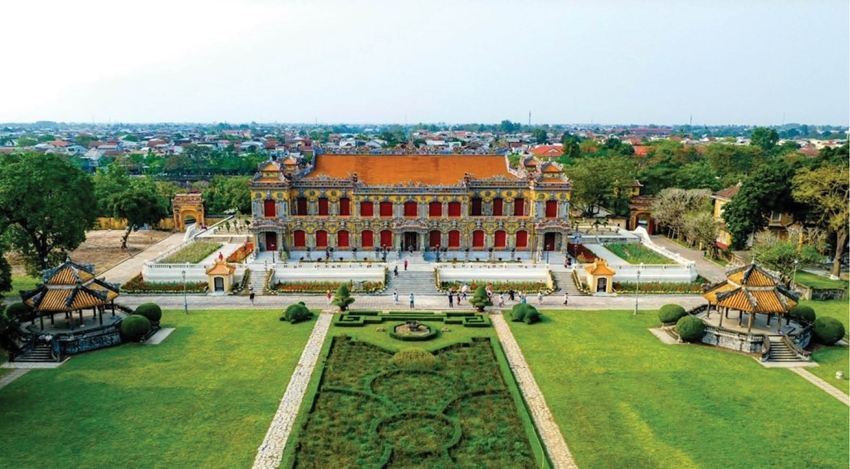With advantages in scenery, cultural heritage, and the ancient, tranquil beauty of temples, palaces, relics, and architecture, Hue is becoming a destination of choice for filmmakers. This also presents an opportunity for cinema to expand Hue's tourism reach.

Kien Trung Palace is chosen as the main setting for the film “The Last Empress”
A destination for filmmakers
On May 7th, a film project inspired by the life of Nam Phuong Empress, titled “The Last Empress,” was officially announced in Hue and is expected to premiere in 2026. This ambitious project unites the creative forces of directors Bao Nhan and Namcito with Vietnamese cinema powerhouses Galaxy Studio and HK FILM.
The film's story is inspired by the novel “The Love Story of Nam Phuong Empress” by the writer Tran Thi Hao. Hue Imperial Citadel will serve as the primary backdrop for the film, thanks to crucial support from the Provincial People's Committee. Notably, Kien Trung Palace will be chosen as the main setting for the film. Additionally, “The Last Empress” project will receive support and expert advice from reputable historians and researchers.
According to director Bao Nhan, “The Last Empress” was initiated after nearly 5 years of research and data collection. This is the first film project about Nam Phuong Empress shot right in Hue, where the most beautiful memories of this special empress's life were left.
In recent years, Hue has become a destination for many filmmakers. In 2019, “Dreamy Eyes” - a Vietnamese romantic drama film - was released to audience anticipation. Thua Thien Hue was chosen as the filming location with many beautiful scenes. The film achieved great box office success, earning 180 billion VND. Filming locations such as the lonely tree (Quang Phu commune, Quang Dien district), Ha Lan's house (Bao Vinh ancient town), and the Kieu Mau High School (now it is the University of Education) later became popular check-in spots for many people.
According to filmmakers, Hue possesses a “precious gem” that filmmakers, especially those in the historical drama genre in Vietnam, desperately need: the charm, antiquity, and serenity of temples, palaces, relics, and architecture. Mai Thu Huyen, the director of the film “Kieu”, once shared that when the film premiered in the US, many viewers were fascinated by the beautiful scenes shot in Hue appearing on screen, such as Dai Lake at Emperor Gia Long's tomb, Luu Khiem Lake at Emperor Tu Duc's tomb, the corridor system in the Forbidden Purple City, Thieu Phuong royal garden, and Phuoc Tich ancient village.
Looking back in history, many successful films have been shot in Hue, not only in terms of audience reception but also in winning awards. For example, “Dong Duong” (Indocine) by director Régis Wargnier was the first foreign film to be shot in the palaces and tombs of the Hue Imperial City complex in the 1990s. After its premiere in France in 1992, this film won an Oscar (for Best Foreign Language Film). Or “Co gai tren song” (The Girl on the River) by director Dang Nhat Minh won the Silver Lotus award at the 1987 Vietnam Film Festival. Recently, “Dreamy Eyes” by Victor Vu also won the Golden Lotus award for Feature Film at the 22nd Vietnam Film Festival.
An opportunity to promote Hue tourism
Effective promotion is crucial for expanding tourism's reach. While local authorities and the tourism industry have employed diverse strategies to market Hue, the concern for “daily necessities and financial concerns” often impede efforts to showcase the province's allure to a global audience. In this landscape, cinema emerges as a powerful and cost-effective tool to spotlight and elevate Hue's tourism potential.
According to a representative of the Vietnam National Administration of Tourism, recently, the interrelationship between tourism and cinema has been creating new values when both sides benefit. The tourism industry promotes destinations through films while also saving costs on tourism promotion and advertising.
Films have the power to transform their shooting locations into sought-after tourist destinations, a phenomenon observed in Vietnam and worldwide. Notable examples include "Yellow Flowers on the Green Grass," which showcased Phu Yen's stunning landscapes, and "Mat Biec," set in the historic city of Hue. Following the release of these films, both domestic and international travelers flocked to Phu Yen and Thua Thien Hue provinces, eager to experience the captivating scenery firsthand.
Thua Thien Hue province has long aspired to establish a film studio in Hue, with a particular focus on historical dramas. However, realizing this vision requires significant effort. To do this, there is still much work to be done, particularly for related departments to develop policies to attract major investors to research and build professional film studios. These initiatives would help sustainably leverage the region's unique strengths in the film industry.
Mr. Nguyen Van Phuc, Director of the Department of Tourism, emphasized that Hue is rich in tourism potential, highlighting its cultural heritage and diverse natural landscapes as ideal film settings. He noted that provincial leaders are keen to support film crews through favorable mechanisms and conditions. Hue's team of dedicated researchers stands ready to advise on historical content, adding authenticity to productions.
The tourism industry sees immense potential in cinematic promotion. The key lies in leveraging this opportunity to develop tourism products and tours centered around film locations. Mr. Phuc expressed a strong desire for film producers to collaborate with local authorities in crafting scenes that effectively capture Hue's unique characteristics through the lens of cinema - the "seventh art”.
Story and photo: Huu Phuc